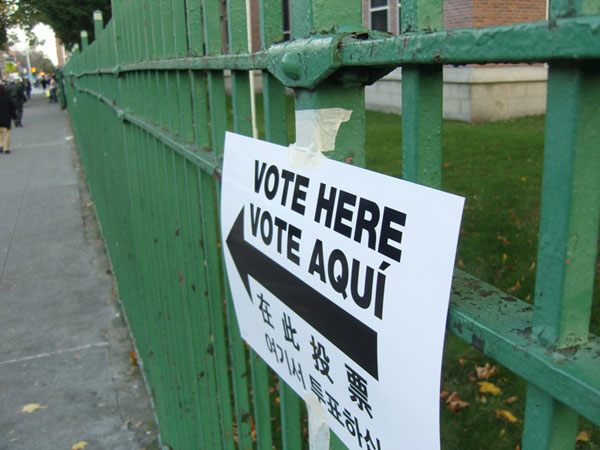
Photo by: Jarrett Murphy
Voters will have a chance to vote on a raft of ballot proposals in November.
Two years after the City Council extended term limits, New York City voters will have a chance in November to return to a two-term limit, after the Charter Revision Commission approved ballot questions Wednesday night.
But even if approved by voters, the full force of the tighter limits won’t be felt until 2022.
The 15-member commission, which has met since March, also approved a question on whether to impose sharply higher fines for ethics violations, and a question on whether to compel the city to consider a wider range of polluting businesses when it makes decisions about whether a particular neighborhood is bearing more than its “fair share.”
But nonpartisan elections, which went down to defeat in a 2003 referendum but enjoyed broad support at public hearings this year, faded with little fanfare. Despite gaining new support from the influential Citizens Union, nonpartisan elections were not recommended by the charter revision’s staff report, which instead called for instant runoff voting. In the end, the commission acted on neither. When chair Matthew Goldstein offered commissioners a chance to weigh in on “top two” elections, which would eliminate party primaries, no one spoke.
That wasn’t the only issue left on the table: independent budgets for some city offices, broader powers for borough presidents, more independence for community boards and deeper reforms to the land use procedure were among the proposals that rose and fell over the spring and summer.
“Working on the charter for six months is not nearly enough time to do due diligence,” Goldstein told the audience, which included former Public Advocate Mark Green and Manhattan Borough President Scott Stringer. “We did the best that we can.”
But in a statement issued later, Stringer insisted the panel could have done better.
“By excluding forward thinking proposals from the ballot–from overhauling the city’s approach to long-term planning to rethinking the Department of Buildings with an Office of Inspection, to bolstering independence for elected and oversight agencies with independent budgets–the members of the Charter Revision Commission are missing a historic opportunity to restore confidence and interest in government among generations of New Yorkers,” Stringer said.
City voters approved a two-year term limit by referendum in 1993 and confirmed that choice in 1996, but Mayor Bloomberg and the Council extended the limit in 2008. Restoring the two-term limit was the chief reason the charter commission was empanelled. At one point, the commission considered limiting the mayor and other citywide and borough-wide officials to two terms but allowing the Council three. But the ballot question keeps it simple: two terms for everybody. If the question is defeated, the current three-term limit will remain. There is no recourse for people who oppose term limits altogether like commissioner Stephen Fiala of Staten Island, who declared: “Term limits are antithetical to our way of life as a republic.” (At one point in the evening, Fiala’s antipathy to term limits drew a few cries of “Shame, shame” from the crowd.)
A separate ballot question will allow voters to decide if the Council should be barred from changing term limits in the future to benefit incumbents.
The three-hour meeting was dominated by a discussion over how to implement the new limits if voters approve them—whether to permit incumbents now serving their second terms to seek a third term in 2017, to allow current first-term officials to seek two more terms, or to limit one or both groups of officials to two terms. After defeating all three proposed approaches, the commission went back and voted by a 9 to 6 margin to permit all current elected officials to serve at least three terms. That means that the public advocate, comptroller, Bronx borough president and new City Council members could be re-elected in 2013 and 2017 and serve through the end of 2021.
Environmental activists had pushed the commission to reform the fair share and 197-a provisions of the charter, which aim, respectively, to protect communities from being overburdened by services that pollute and to allow communities to plan future development in their neighborhoods. The commission approved a modest upgrade to fair share that required not just city, but also state, federal and private transportation and waste transfer infrastructure to be taken into account when the city decides whether a new facility will overburden a neighborhood. Power plants were omitted.
Ballot questions were also approved on:
Now the commission will work to educate voters, Goldstein said, and draft its final report. “We want to leave a record of work that was undone so that future commissions will build on the very good work that we have done,” he said.








